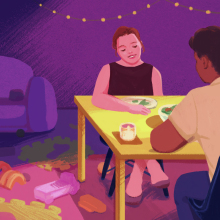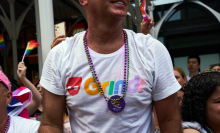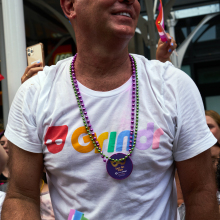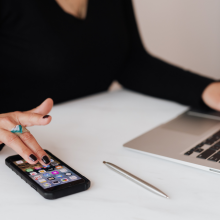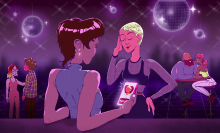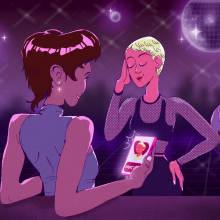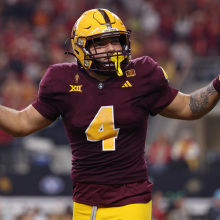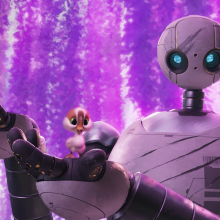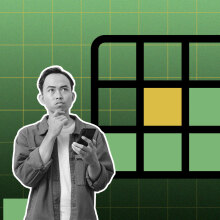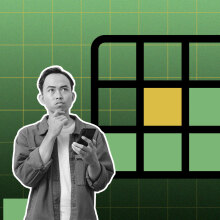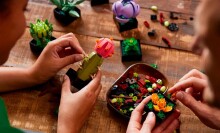Last month, the dating app Bumble — which was known for allowing only women to message first in hetero matches — announced a revamp of its signature feature. Now on Bumble, men can message first with "Opening Move," a prompt that women can set for this purpose. As part of a bigger revamp of the app, Bumble added more prompts, which a different dating app, Hinge, made famous.
This is a continuation of a recent trend of dating apps copying each other. Towards the end of 2023, Tinder added prompts too. Tinder also recently added Relationship Types (like monogamy and non-monogamy) and Relationship Goals (long-term, short-term) — which Bumble and Hinge already had.
As these apps become more of a slog for daters, they're also becoming an amalgamation of each other. According to experts, it echos social media companies' cloning features — and could be contributing to the unhappiness with the apps lately.
Different dating apps, same features
Variation between the apps used to be why people chose one over the other, said Melissa Fabello, a relationship coach for politicized people and Ph.D. in human sexuality studies. Tinder was "the hookup app," for example. Bumble branded itself as the "feminist dating app" and had "women making the first move." Hinge's tagline was — and still is — "designed to be deleted," giving off the notion that it's for long-term monogamous connections.
Over time, however, these connotations have shifted. For example, Hinge now has non-monogamy filters, when apps like Feeld were made purposefully for non-monogamous people.
"It's strange to me that all of these apps would try to start to look like one another," Fabello told Mashable, "which kind of makes it pointless to be your own app."
Take the recent Bumble revamp. Reactions from users have been…mixed.
"It defeats the purpose of Bumble," dating coach Erika Ettin told Mashable. When a woman messages first, Ettin said, she can control the trajectory of the conversation, and she can learn a lot from how someone responds. Ettin also recommends her clients message matches about something from their profile — but with Opening Move, users don't have to look at the rest of the profile before matching.
Ettin said a lot of her women clients are confused about the change; they're wondering why men are messaging them first now. A Bumble spokesperson told Mashable that the app's core focus is on women's experiences, and the company continues to prioritize that as it "enters a new era of dating."
"Bumble is the only app that puts women's experiences first and gives women a level of control that they don’t have in other dating apps," the spokesperson continued. "Now more than ever, we need to advocate for women and with our latest updates — Opening Moves — we are redefining what it means for women to feel empowered and in control of their dating life."
"We will stay relevant through our fundamental belief that by making the world better for women, we are making the world better for everyone, and that includes continuing to empower women in every aspect of their life," the spokesperson concluded.
These user experience (UX) changes coincided with an ad campaign, including an anti-celibacy ad that landed Bumble in hot water. The app apologized for it, admitting that it missed the mark.
Ettin also identified similarities in how the apps obtain money through premium features: A Rose on Hinge and SuperSwipe on Bumble to indicate extra interest in someone; Standouts on Hinge and For You on Bumble, a section with algorithmically more compatible (or attractive) people that users need to pay to express interest in.
"At Hinge, our app is intentionally designed to help people get out on great dates," a Hinge spokesperson told Mashable. "Every feature is created to help daters be more intentional about who they are, who they like, and why they like them. Additionally, we have an internal team of Ph.D. researchers and behavioral scientists who study how to solve user problems and optimize the app to help our community safely and efficiently meet in person."
To be sure, these two apps aren't totally similar. Bumble is swipe-based and Hinge isn't, for example. But Bumble has been at least inspired by Hinge's features.
According to author and comedian Lane Moore, however, how an app branded itself never stopped users who wanted other things from signing up. Moore hosts the show Tinder Live! and wrote the books How to be Alone and You Will Find Your People.
"I think in the beginning it was a great idea to have apps for people who wanted to just hook up, and apps for people who really wanted a relationship," Moore told Mashable over email, "but people quickly realized that just because an app says that, doesn't mean that prevents users who want the opposite of that from joining. So you still have to sift through no matter what."
Why do dating apps have the same features now?
We've seen feature-copying before, on social media.
"I remember how wild it was when Instagram added a story feature and it was just so obvious it was competing with Snapchat," said Fabello. "Then TikTok comes along and all of a sudden Instagram introduces Reels."
It's obvious these apps are competing with one another, Fabello continued. If there's a feature everyone loves on one app, they may hop over there — while the app without it loses users.
There's also the fact that many of the major dating apps, like Tinder, Hinge, and OkCupid, are owned by the same conglomerate: Match Group. (Match Group also owns Match, unsurprisingly, and smaller dating apps as well.)
"I would imagine that they're figuring out what works best on their end and making it so all of the apps start to share some of those qualities," said Fabello.
With prompts and relationship goals and types, for instance, Tinder is looking more like Hinge, but with swiping. Tinder used to be more bare-bones in its UX: name, photos, age, and space for a bio. For an app focused on hooking up, this was all it needed. Now, in 2024, Tinder seems to be rebranding away from hookup culture in favor of fostering longer-term relationships.
"There was something to be said for Tinder before, where it basically had nothing except an empty box," Ettin said, "because that does make people more open minded. The more criteria you can filter on, the more selective people get."
"At Tinder, our focus is on creating the best possible experience for our users by introducing features that resonate with our community's desire to show up authentically," a Tinder spokesperson told Mashable.
Even if the apps aren't owned by the same company, they can glean information from each other. In terms of why Bumble — which is part of Bumble Inc. — added prompts, Ettin guessed because they work well on Hinge.
People are over dating apps
These dating app shifts correlate with a time where people are less and less enthused about dating apps. Dating app fatigue isn't new, but has seemed to reach new heights in 2024. Such exhaustion was one reason Bumble CEO Lidiane Jones said Bumble reconsidered "women making the first move" — because women are exhausted by dating apps. Hinge founder and CEO Justin McLeod said Hinge is "keenly aware" of dating burnout in an interview with Mashable.
This is starting to translate into dollars: Tinder payers declined nine percent year-over-year from the first quarter of 2023 to that of 2024. (Direct revenue for both Tinder and Hinge, owned by Match Group, increased in the same time however, as did Hinge payers.)
Dating apps make dating hard, despite everyone's want for an easy path to love and connection, said Moore. "With dating apps, yeah, we don't have to leave our house, but it's so much harder to know how someone actually is outside of the app," she said. When she started offering dating app makeovers a few years ago, Moore discovered that people had awful dating profiles — not because they themselves were awful, but because they didn't know how to translate how great they are in their profiles. Add making over one's dating profile as yet another task for online daters.
"One-thousand percent" people are over dating apps, Fabello said. She compared dating apps to dieting companies in that they're designed to fail. It's difficult to get someone to engage in conversation, even more of a hurdle to agree to a date, and you're surrounded by people with different goals in mind for why they're on the app in the first place.
"Wouldn't it be great if there were just different apps for these different things?" she mused. She used "unicorn hunters" — typically a straight couple looking for a woman to be a third in a threesome — as an example. There are apps designed for non-monogamous connections, like Feeld, and yet these couples are on other apps like Tinder. Fabello guessed this is because they haven't researched and aren't educated on how to ethically go about finding a third.
Another problem with some of the popular dating apps — including Tinder, Feeld, and Bumble — is the reliance on swiping and thus physical attractiveness, Fabello continued. This certainly isn't a new complaint, and there's nothing wrong with valuing this. Fabello compared it to walking in a bar; you're not going to talk to everyone, but the people you find attractive.
"But it's so similar to the way that social media feels like a game," Fabello said. Like all apps, the point is to keep you on the app or encourage you to pay for extra features, she said. These apps are businesses, and they're designed to be deleted make money. The fact that dating apps gamified dating isn't a novel revelation either, but it's yet another reason why dating apps are getting old.
As both a user of dating apps and a coach, it's becoming harder and harder for Fabello to determine what app her clients should use based on their needs and what they're looking for. "I'm not a business person — but it just feels like, ultimately, that's going to be the downfall of the apps."
Topics Apps & Software





